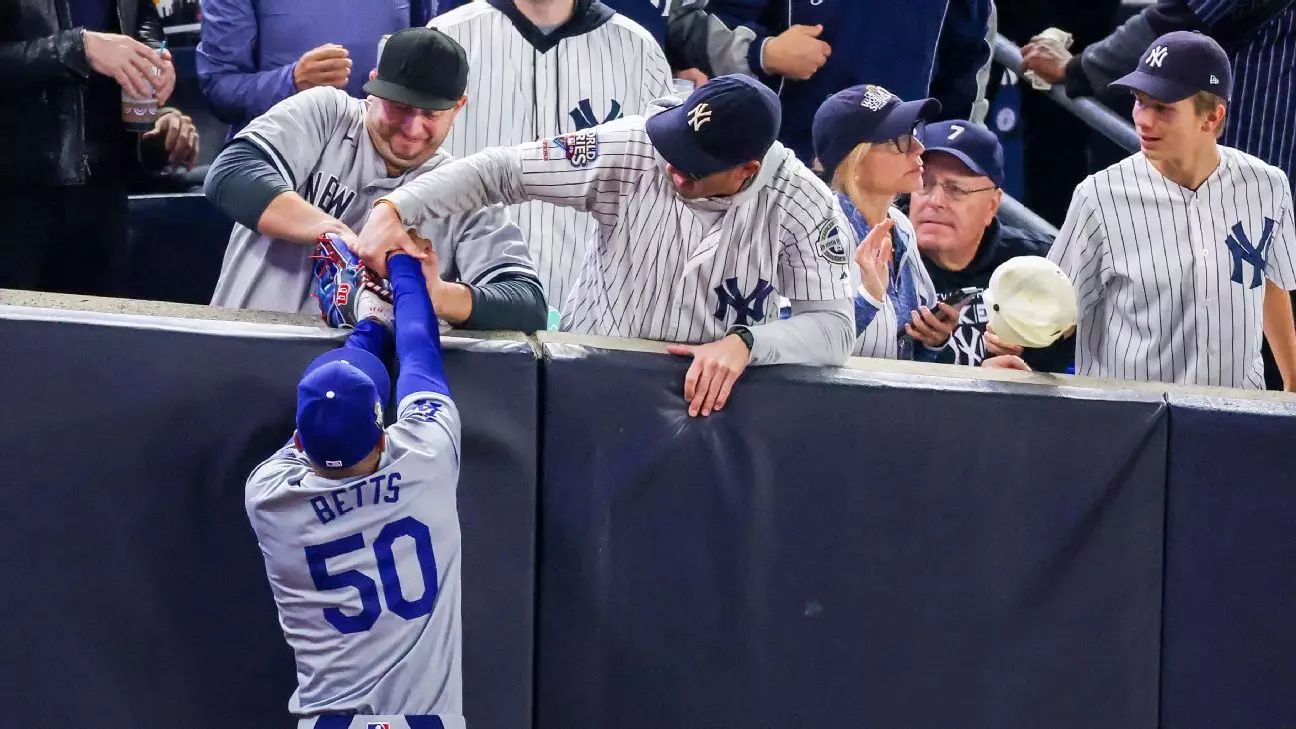The bright lights of Yankee Stadium cast an air of excitement on Game 4 of the World Series, but an incident in the stands quickly overshadowed the sporting spectacle. Two fans, Austin Capobianco and John Peter, were ejected after an utterly outrageous attempt to interfere with the game, one that involved prying a foul ball from the glove of Dodgers’ star right fielder, Mookie Betts. Their actions, motivated by a misguided sense of team support, raise critical questions about fan conduct in professional sports, especially during something as prestigious as the World Series.
In the first inning, as Betts stretched to make an impressive catch of a foul ball hit by Gleyber Torres, Capobianco made an impulsive decision. Grabbing Betts’ glove with both hands, he yanked the baseball free. This act of blatant fan interference not only violated the unwritten rules of sportsmanship but also resulted in Torres being ruled out by the umpire. This scenario is not merely a lighthearted moment of fan engagement; it illustrates a serious breach of game etiquette, one that could have consequential implications for the players and the game itself.
Capobianco, a 38-year-old Yankees season ticket holder, later openly justified his actions, revealing that he and his friend often joked about intercepting balls if they came their way. “If a foul ball comes our way, we’re going to do what we can to help our team,” he stated after the game. This rationalization reflects a disturbing mindset prevalent among some fans today: the idea that their participation—no matter how disruptive—somehow contributes to the momentum of their team.
Yet, this misguided enthusiasm begs the question of whether such outrageous conducts should ever be excused in the name of team loyalty. Can intentionally interfering with a player during a championship match ever be seen as acceptable? Capobianco’s actions could have impacted not just the game’s outcome but Betts’ performance and state of mind. At its core, this incident speaks to a larger cultural phenomenon in sports where fans mistakenly believe that their passion grants them license to intrude upon the game’s integrity.
Responding to the chaotic moment, Betts exhibited a commendable level of professionalism, characteristically downplaying the incident. His focus was swiftly redirected to the loss incurred by the Dodgers rather than the senseless interference he faced. “When it comes to the person in play, it doesn’t matter,” he was quoted as saying. This reaction underscores a vital quality among professional athletes: the ability to compartmentalize distractions, keeping their focus on the performance and the game itself.
From Betts’ perspective, this incident serves as a painful reminder of the unpredictability inherent in professional sports. However, his resilient attitude promotes a deeper understanding of the emotional toll such events can have on players, while also highlighting the responsibility fans have in maintaining the sanctity of the game they love.
Consequences and Reflections
In the wake of this unfortunate encounter, Capobianco and his friend were escorted from Yankee Stadium but were informed they could return for Game 5—a decision that raises serious considerations. Should fans engage in behavior that disrupts the game, should they simply be welcomed back without consequences? Is a “slap on the wrist” really sufficient to deter such misconduct in the future?
Moreover, the psychological impact of fan interference isn’t often discussed. It may seem trivial on the surface, but for players, such events can rattle confidence and disrupt their rhythm in high-stakes games. As the Dodgers were unable to hold onto their lead and ultimately lost 11-4, questions linger about how environment and conduct outside the field influence the outcome of critical moments in professional sports.
A Call for Responsible Fan Behavior
Throughout this incident, it becomes painfully clear how essential it is to cultivate a culture of respect and responsibility among fans. Sporting events are communal experiences that should celebrate talent, dedication, and discipline, rather than petty fan interference. As audiences, there is a fine line between enthusiasm and disruption, and it is vital that this line is respected to preserve the integrity and enjoyment of the game for everyone involved. In an era where sports fandom can escalate into dangerous or unbecoming behavior, a call to action is warranted: let us cherish and honor the game, its players, and the very essence of fair play.


Leave a Reply